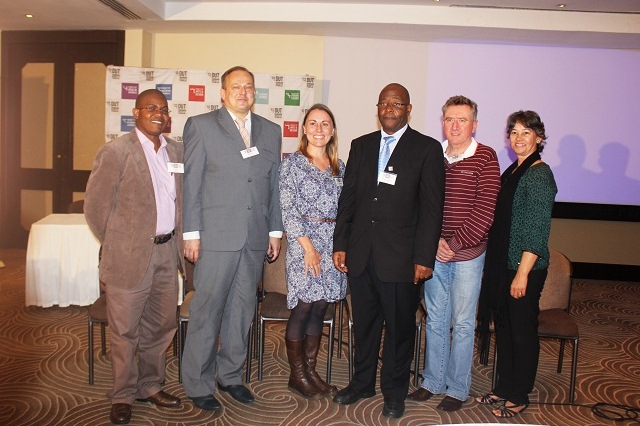Sharing insights on academic literacy and exploring theoretical and practical approaches to issues relating to the English language was the purpose behind the two-day symposium organised by DUT’s Centre for Excellence in Learning and Teaching (CELT).
The event, which took place at the Elangeni Hotel recently, interrogated the use of English as a language of learning and teaching within the context of cultural diversity and multilingualism. The event also formed the basis of ongoing academic discussions on the question of what it means to be academically literate and whether academic success hinged on academic literacy and having a reasonable grasp of the language of learning and teaching.
Invited speakers at the event included Professor Cecilia Jacobs, Director of the Centre for Teaching and Learning at the University of Stellenbosch, Mark Krzanowski, an Editor and Lecturer at the University of Westminster London, Dr Alan Cliff, Senior Lecturer and Co-ordinator of Academic and Professional Staff Development in the Centre for Innovation in Learning and Teaching (CILT) at the University of Cape Town, Dr Sherran Clarence from Rhodes University and Dr Gift Mheta, Writing Centre Co-ordinator at DUT.
The invited speakers focused on themes such as the conceptual underpinnings of academic literacy in higher education and critiquing the conceptions of English for academic purposes in higher education.
DUT’S CELT Director, Professor Thengani Ngwenya, welcomed the invited guests, DUT staff, students and various stakeholders to the two-day event, adding that he hoped that this symposium would be the first in a series of academic discussions on the languages of higher education.
Invited speaker, Professor Jacobs, tackled issues on academic literacy and the question of knowledge. She also explored how academic literacy as a body of work defines itself.
Dr Clarence, who spoke on academic literacy, writing and the role of disciplinary knowledge, argued that much academic literacy work, especially that done with students on the subject of academic writing, has always been concerned with disciplinary knowledge.
“When we work with students, we have to consider what they are writing about, what the task is for and how they need to accomplish it. I would argue that although academic literacy work is concerned with knowledge in the disciplines, we are still struggling to really get to grips with what disciplinary knowledge are in terms of what, how and why they expect students to think, read, write, do, and be,” she said.
Dr Mheta reiterated the importance and the role of dictionaries in enhancing student learning in the South African higher education sector. “The importance of utilising any available resource (dictionaries included) to ease understanding of general and discipline specific texts cannot be over emphasised in the South African post school sector in which the levels of literacy in English, the Medium of Instruction (MoI), are generally not satisfactory,” he said. He further added that there is a need to inculcate a dictionary culture in the South African higher education sector.
The second-day of the event included workshops which brainstormed some effective pedagogic solutions to issues affecting the delivery of the higher education curriculum on undergraduate and postgraduate courses in SA universities, and with a particular emphasis on KZN tertiary institutions as well as the understandings of and approaches to teaching academic writing in the disciplines.
Prof Ngwenya said the symposium provided an excellent opportunity for sharing insights on academic literacy in the context of a post-school system characterised by multilingualism. “We plan to have this gathering of experts and practitioners on annual basis so that we can continue to interrogate the notion of English for academic purposes and explore various ways in which academic literacy may be embedded in the programmes offered at DUT. The importance of language in mediating learning cannot be over emphasised,” said Prof Ngwenya.
– Waheeda Peters
Pictured: DUT’s Dr Gift Mheta, Mark Krzanowski from the University of Westminster London, Dr Sherran Clarence from Rhodes University, DUT’s CELT Director Prof Thengani Ngwenya, Dr Alan Cliff from UCT and Prof Cecilia Jacobs who is the Director of the Centre for Teaching and Learning at the University of Stellenbosch, at the event.


